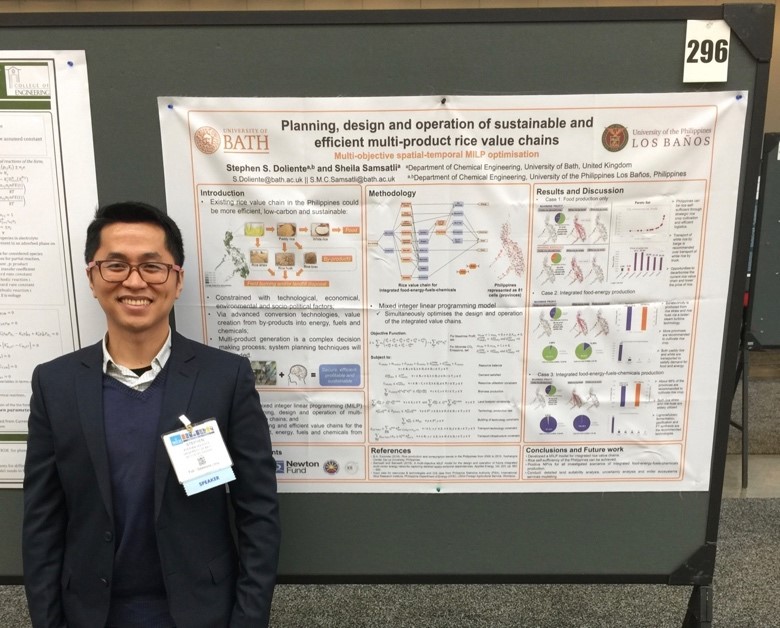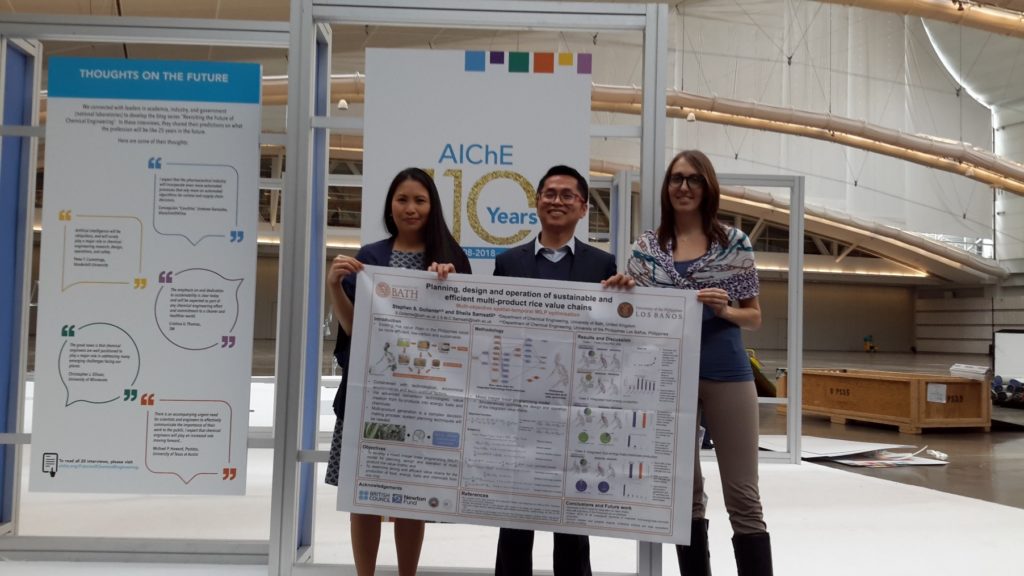Author: Stephen Salve Doliente, PhD Student in Chemical Engineering; First Prize Winner, 2018 AIChE Annual Meeting Sustainable Engineering Forum Poster Competition -
Considered as the leading and largest convention for chemical engineers interested in innovation and professional development, I am wholly grateful for the opportunity to have a successful participation in the 2018 AIChE Annual Meeting held in the David Lawrence Convention Centre, Pittsburgh, Pennsylvania, USA from 28 October 2018 to 02 November 2018. Below are some of the information and details of my experience that I am happy to share. These can be quite helpful to PhD students in ChemEng who are interested in attending future AIChE Annual Meetings.
About AIChE Annual Meeting
This yearly conference is organised by the American Institute of Chemical Engineers or AIChE and is attended by roughly 7000+ chemical engineers every year. Although AIChE is American-based, they have over 60,000 members from more than 110 countries. In fact, it is the world’s top association for chemical engineering professionals. Hence, AIChE’s tag line is “The Global Home of Chemical Engineers.” (By the way, being a member has some benefits that I am going to discuss in the next section.) All the same, both AIChE members and non-members from across the globe attend the AIChE Annual Meeting. At the conference, experts from industry and academia discuss a variety of topics from the fundamentals and education of chemical engineering to cutting-edge research, emerging technologies and new breakthroughs of multi-disciplinary perspectives.
The 2018 Annual Meeting marks the 110th anniversary with the very first one that also took place in Pittsburgh. Hence, befitting was this year’s theme: “Today, tomorrow and leading the future”. AIChE celebrated their long history of chemical engineering accomplishments as well as emphasised the vital role of chemical engineers for a sustainable future. The drive for sustainability echoes through various topics and activities in the 5-day conference. (AIChE even offered to take care of the recycling of the programme book that one gets during the registration.)
Attending the AIChE Annual Meeting
So how did I come to attend the AIChE Annual Meeting? I was encouraged and motivated to participate by my PhD Supervisor, Dr. Sheila Samsatli, who herself is a regular and enthusiastic participant and session chair in the conference. Attending a premier conference like the AIChE is a great opportunity to disseminate my research and expand my network.
When I confirmed my participation in the conference, Dr. Samsatli and I got to immediately work on the abstracts. To participate in the AIChE, one has to submit an abstract and obtain acceptance for either a paper or a poster presentation. One can opt to submit just one but I submitted two. The call for abstracts typically opens in mid-January and closes in mid-April. Then one receives the acceptance notices by July. The typical timeline of the AIChE Annual Meeting is shown here. Both of my abstracts were accepted, one for oral presentation and another for poster presentation. Receiving the acceptance notifications was relieving while at the same time cementing my commitment to the conference.
After the acceptance notification, one has to register to the event. The schedule of fees is shown here. Remember I mentioned about joining AIChE has some perks in the previous section, one is the significantly discounted early registration fee for graduate students. For an annual membership fee of US$50, you can also access technical information, trainings, and professional connections that can be helpful to your research and professional development as a PhD student.
Once you have settled the registration, it is advisable to book the flights and accommodation as early as possible to avail of the cheaper rates. To aid your search for flights within your budget and schedule, I recommend Kayak and Skycanner. Besides securing the flights, one has to check the US VISA requirements for attending scientific conferences shown here. However, for eligible countries like the UK, their citizens can avail the VISA Waiver Program (VWP) . If you need a US Visa, my advice is to arrange the application as early as possible to obtain the earliest date of the interview at the US Embassy in London. By making sure I complied with every instruction from the online application up to the interview session, I gained an approved US B1/B2 VISA within just two weeks. Now for the accommodation, conference organisers typically recommend hotels nearby the conference venue. However, if your budget is limited, I recommend a low-cost accommodation that you can share with your companions in your research group. In my case, we stayed at a lovely and affordable accommodation we found in AirBnB which has both kitchen and laundry amenities.
Finally, I want to close this section on funding your participation to the conference. It is best to begin with a reasonable estimate of the expenses and as much as possible stay within the budget. Then, you have to discuss the available funds with your supervisor such as from your bench fees and project funds your supervisor may have. On the other hand, you may also would like to explore funding from the University such as the Alumni Fund, which awards small travel grants on a competition-basis.
During the AIChE Annual meeting
After almost 24 hours of journey from Bath to London then to Atlanta (2-hour lay-over), we finally arrived in Pittsburgh. As traveling from London to the USA is like traveling back in time, to avoid getting jet-lagged, I was awake during the whole flight but I slept afterwards upon arriving at our accommodation. We arrived after midnight on 28th October, which was the opening and registration day. Nine hours later, we made it to the David Lawrence Convention Centre, registered and started journeying through 18AIChE.
Here on in, I am going to communicate my experience and reflections on the notable technical sessions I attended. First, in the Meet the Faculty Candidate Poster Session, where current graduate students and post-doctoral researchers seeking faculty positions speak to recruiters and existing faculty. I mainly attended this session to observe and obtain tips in presenting a poster from experienced individuals. My other insights were from a chat with a recruiter that the ideal faculty candidate must highlight their passion for the academia while at the same time remain humble. The recruiter also added that the faculty candidate must demonstrate the mission-vision of their future teaching and research endeavours. Second, I attended the technical sessions on Biorefinery Logistics and the Food-Energy-Water Nexus that are mostly related to my PhD Project. My main learning from these sessions is the importance of biomass in meeting our greenhouse gas emission reduction targets in line with the efforts to mitigate climate change. Moreover, the emphasis of some presentations on systems approach in managing resources and deploying disruptive technologies of bio-based economy. Finally, I attended the Future of Energy in the Region, Nation and World, a feature session where academia, government and industry experts shared their views. The key insights I gained from these talks are that clean energy technologies remain underutilised and the technologies of the future must directly convert chemical energy to electrical energy. These reminded me that it is good to be in the chemical engineering profession because first, we are problem solvers at your service, and second, echoing Dr. Samsatli, we are at the heart of process systems integration, for a more sustainable future. Earning more inspiration and motivation from the sessions and events, I hope to contribute to this sustainable future through my PhD study.
Presenting some results of my PhD project

My PhD project is entitled, Biomass Value Chains and the Environment-Food-Energy-Water Nexus in the Philippines: A Whole-systems Analysis and Optimisation. During my participation in the 2018 AIChE Annual Meeting, I presented our work in progress for the rice value chain of the Philippines with an oral presentation entitled, Food, Energy, Fuels, and Chemical Feedstocks from Rice Crops: Multi-Objective Optimisation of Multi-Product Value Chains for the Philippines (Tuesday, 30-October-2018, 13:10-13:30), and a poster presentation entitled, Planning, Design and Operation of Sustainable and Efficient Multi-Product Rice Value Chains Using Multi-Objective Spatio-Temporal Optimisation (Wednesday, 31-October-2018, 15:30-17:00). We believe that the rice value chain, especially in the Philippines, can improve its operation becoming more secure, efficient, profitable and more sustainable. We envision a future rice value chain that will not only produce food from the rice crops but will also produce energy, fuels and chemicals from the by-products of the rice crop farming and paddy rice milling using advanced conversion technologies. We postulate that a well-designed rice value chain can usher in waste reduction, value creation and circular economies benefitting the producers and consumers along the rice value chain. However, systems integration of multiple resources, products and technologies can involve many complex issues. Using a novel and powerful mixed integer linear programming formulation developed by Dr. Samsatli, we extended this for a multi-product rice value chain model expressed as a multi-objective optimisation problem. The model is largely data-driven wherein we have taken into account spatial distribution and temporal variability of rice crop yields, available arable land and product demands. Moreover, our model can determine the optimal rice value chain at the national level for production of food, energy, fuels and chemicals from rice crops when exploring trade-offs between maximising profit and minimising CO2 emissions. From our case study on food-production, the model was able to determine both a highly profitable and a low CO2 emission rice self-sufficient Philippines. Moreover, the optimal value chains that the model generated showed a lower price of white rice, a reduction of land-use for rice crop farming and a more efficient operation of white rice transport by barge. On our case studies for the integrated production of food, energy, fuels and chemicals from rice crops, the model generated optimal value chains for pairing of by-products (rice straw and rice husk) and their corresponding conversion technologies that resulted into additional revenues. These optimal value chains show that the current practice of rice crop farming throughout most arable land in the Philippines can become more profitable and sustainable if the food-only rice value chain is transformed into an integrated food-energy-fuels-chemical rice value chain.

Both my oral and poster presentations were well received. In my 20-minute oral presentation, I was able to detail our research in more depth. While for the poster presentation, (in addition to the poster session itself) I had to give a three-minute pitch only, which is quite challenging. Hence, it was exceedingly a rewarding and humbling experience for a first time attendee, when I was awarded with First Place in the Graduate Category for the Sustainable Engineering Forum (SEF) Poster Session for this year 2018 AIChE Annual Meeting. I am truly grateful for this distinction and opportunity. Moreover, it was a truly triumphant moment for Dr. Samsatli and me; our intensive work and collaboration these past few months paid off. We are definitely looking forward for our future work of further developing the model, writing a journal article or two, and disseminating the results to relevant government agencies in the Philippines.
Perks of AIChE Annual Meeting
As with all conferences, the AIChE Annual Meeting is a grand opportunity to network with graduate students, faculty and practicing young and senior professional chemical engineers both in the public and in private sectors. Night events like Young Professionals’ Night and technical session dinners are venues to meet new friends, chat about life and unwind from the technicalities.
Finally, travelling to conferences in another country is a great opportunity to do some sight-seeing, to try local food and to enrich your knowledge of the history and culture of its people. Pittsburgh, called as the City of Bridges, boasts a number of museums, parks and sports facilities, as well as culturally diverse restaurants. Hence, if you have time to spare, make sure to look around and enjoy!

With the fossil remains of the Apatosaurus lousiae in the Carnegie Museum of Natural History.
Overall, my journey to 18AIChE was a blast. I look forward to being able to attend the next one. Hope to see you next year at the 2019 AIChE Meeting in Orlando, Florida!
Acknowledgements
I am more than grateful to my PhD Supervisor, Dr. Sheila Samsatli, for her mentorship, inputs and support.
I am thanking my lab mates in our research group for their assistance and support.
I am thanking my funding sponsors: The British Council and the Philippine Commission of Higher Education through the CHED Newton Agham PhD Scholarship under their Newton Fund Project and CHED K-12 Transition Programme, respectively, co-funds my PhD project. The Engineering and Physical Sciences Research Council and the Science and Technology Facilities Council through the BEFEW project (Grant No. EP/P018165/1) also provided some additional financial support for this conference.
Respond
